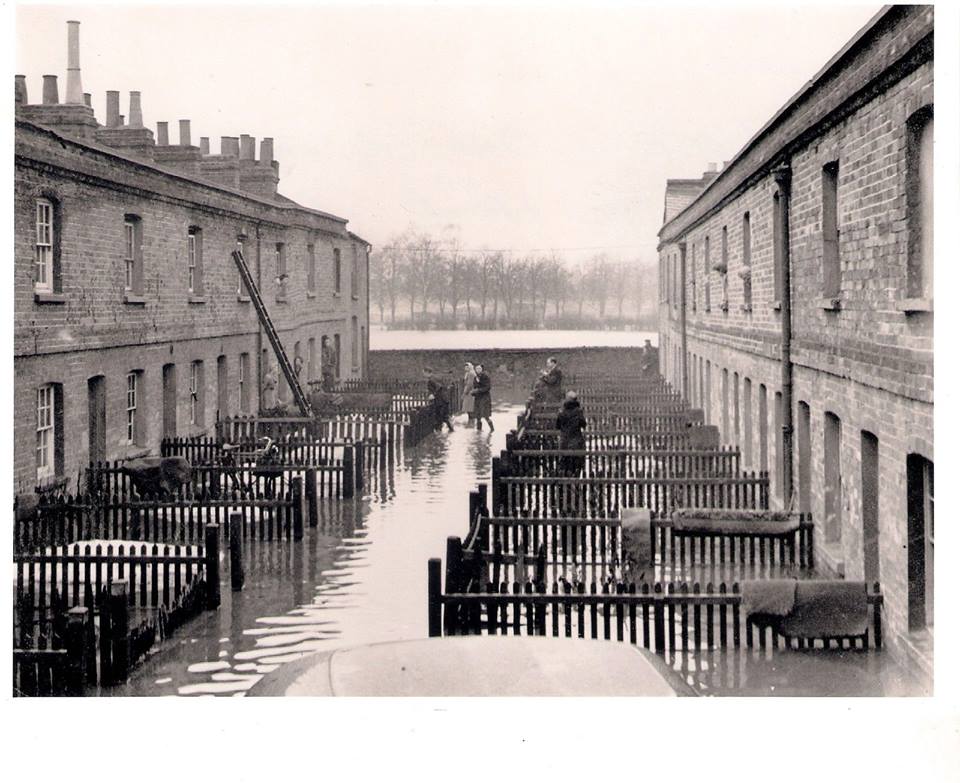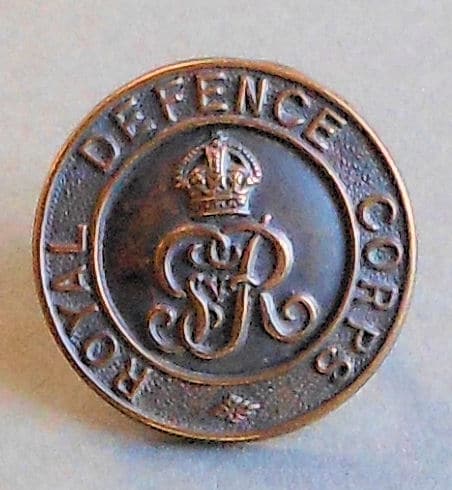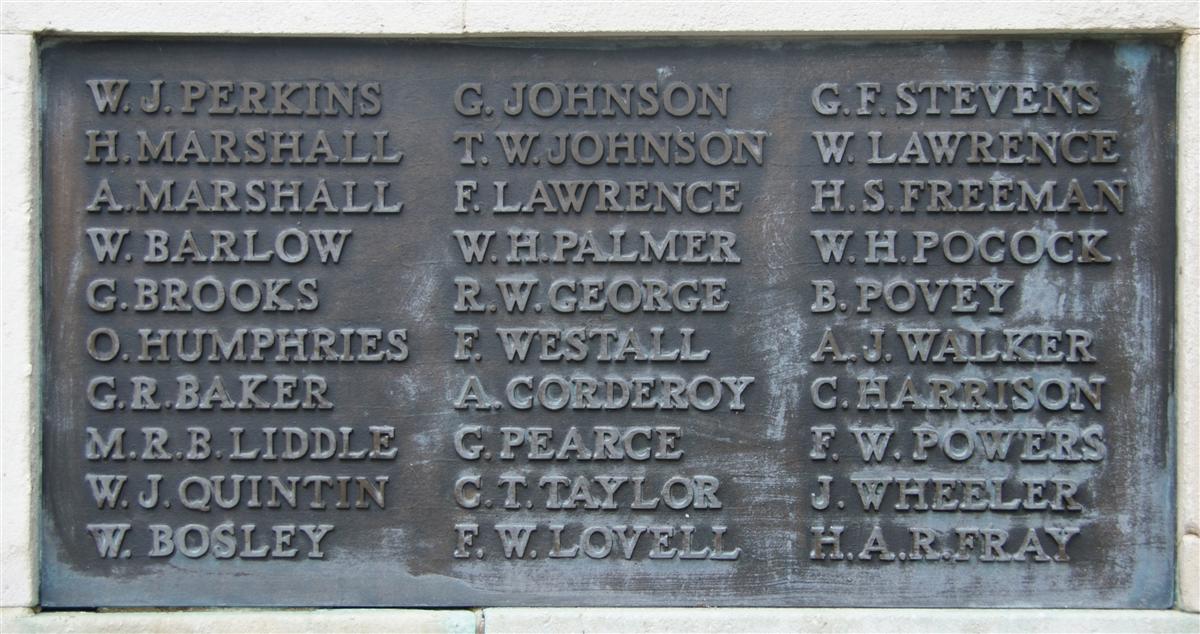Walter Henry Pocock
Private Walter Henry Pocock, National Reserve.
Walter was born in Newbury in 1866, the son of John Pocock and his wife Rebecca née Clack; he was the first of their eleven children. His siblings were Sarah Ann (1867-1867), Ellen Ada (born 1868), Samuel George (1870), Annie Minnie (1871), Austin William (1873), Mary (1875), John Charles (1878), unnamed sister (1880-1880), Ernest (1881-1882) and Rebecca (1884). The deaths of three of the children in infancy was sadly typical of the times. Ellen also died young, in 1884 aged only fifteen.
When John died in 1885 aged only 40, the eldest of his seven surviving children was no more than seventeen, the youngest still a baby. For five years Rebecca coped alone until, in 1890, she re-married, to Alfred Denness, a widower with five children of his own (Alfred, 1870; William Henry, 1872; Charles, 1877; James Isaac, 1880; and Herbert George, 1886). The 1891 census entry for the combined family shows Alfred and Rebecca with nine of their children, aged 5 to 20, living at 10 Waldegrave Place – a six roomed housed in an alley off Northbrook Street (behind Toomer’s ironmongery shop). Young Austin, aged 16, was not with the family, he was living in Barrow-in-Furness working as a cabinet maker’s assistant for his uncle, William Lipscombe.
Walter was the other Pocock child who had left home, he does not appear in the online indexes for this census, which may mean that he was omitted, misentered or mistranscibed, but it probably mean that he was out of the country. The most common reasons for a man of Walter’s background to be overseas would be that he was out of the country on military service.

Waterloo Terrace (under water in the 1947 flood), William and his family lived at No 6. |
On 7 May 1898 Walter and Emily’s first child, Walter John, was born followed by Harry Belmont (1900), William Stephen (1902), Richard Thomas (1904), and Stanley Charles (1913). At the time of the 1901 census Emily is listed as the head of the household and there is, again, no sign of Walter anywhere in England or Wales. Once again this could be due to military service; a great many men volunteered to serve in the rapidly expanded army that fought the war against the Boers, but Walter may well have been called up as a reservist (or volunteered if his term in the Reserve was over) to spend a year or so in an overseas garrison freeing up a younger man to serve in the war. He was evidently back in Newbury shortly after the Boer War ended in 1902 and was, by 1911, earning a living as a coachbuilder’s assistant.

The badge of the Royal Defence Corps |
The camp grew and a separate tented enclosure was created to expand its capacity as prisoners of war joined the internees. As winter began to set in it was recognised that the facilities on the racecourse were unsuitable, but the few months that had passed since August had allowed for longer term facilities to be prepared. The internees were sent to a purpose-built hutted encampment on the Isle of Man and the PoWs went to a number of obsolete ships anchored off Ryde on the Isle of Wight. The Newbury guards became to warders on these ships; Walter was stationed on the SS Ascania, an old liner.
Later the prisoners were moved again, to larger capacity purpose-built camps on the mainland, but Walter did not go with them, by this time he had been discharged as being medically unfit.
He returned to Newbury where the family had settled at 6 Waterloo Place, two facing terraces of houses off West Street (the site is now a car park).
Whatever his medical issue was it may well have been serious. He died at home on 14 April 1919, his cause of death is not known, but the natural suspicion is that it was the result of whatever caused his discharge.
Newbury Weekly News, 17 April 1919 – Deaths
POCOCK. - April 14, at 6, Waterloo Place, West Street, Walter Henry, the dearly loved husband of Emily A Pocock, aged 53 years. - Thy will be done.
He was buried in Shaw Cemetery three days later:
Newbury Weekly News, 24 April 1919 – Newbury
The death occurred, on April 14, of Mr Walter Henry Pocock, at Waterloo Place, West Street, Newbury. He served in the South African War, and in September, 1914, was called up with the National Reserve to guard German prisoners on the Racecourse. He was afterwards taken ill while performing the same duty on the liner “Ascania,” and was discharged as medically unfit. He leaves a widow and five sons, two of whom are on service. The funeral took place on April 17, at the Borough Cemetery, the Rev L R Majendie officiating. The mourners were the widow and four sons; Mr Wylde, brother-in-law; Messrs S and Austin Pocock, brothers; Mrs Turner and Mrs Lewis, sisters; and Mr Russell, representing Messrs Pass and Co. Wreaths were sent by wife and sons; Mr and Mrs Wylde, employees Messrs Pass & Co; staff of West Street School; neighbours; Annie and Lill, Sam and Beck, Mother and Jack, Polly and Albert, Mrs Champ. Messrs Hail and Son were the undertakers.
 Walter's name on Newbury War Memorial. (upper right) |
While the Commonwealth War Graves Commission is prepared to add names to its Debt of Honour database and the circumstances of Walter’s death may well qualify him for inclusion, the necessary proof of a link between his death and his war service no longer exists.
Family
Walter’s brothers were too old to serve and most of his sons were too young, except for the eldest, William John.
William was sixteen when the war began and had just turned eighteen when conscription came into effect in 1916. He was enlisted into the Royal Berkshire Regiment on 25 May 1916 on short service terms ie. he enlisted as a regular soldier for 12 years, not the more common ‘duration of the war’ terms. This committed him to 8 years service in uniform and a further 4 in the Reserve. It is possible that he was attracted to army life, or that the pay was a little better. He trained with the regiment in the UK until he was posted overseas to join the regiment’s 2nd Battalion in the field in France, crossing the Channel on 25 May 1917 exactly one year after his enlistment.
Whilst in France his disciplinary record begins to show problems, dirty on parade, disobeying an order then being AWOL – not good signs. However, a letter, written on 22 October 1917 to the CO of No 15 Casualty Clearing Station (Special Hospital) sheds a lot of light on the situation:
Reference attached Report. No. 24192, Pte. Pocock, W.G. [sic] 2/Royal Berks. came with other men from No. 62 C.C.S. as Temporarily Unfit, to work on Agricultural Labour for one month. These men were regarded as on the strength of V Array East Station.
I noticed when visiting the farm on which Pte. POCOCK was working, that he was in an extremely nervous state, and that he had very little control over his muscles.
And enemy aeroplane came of about two nights after I had seen him, and bombs were dropped in the vicinity of the farm. All the men working including a corporal ran out of the billet. The following morning the Corporal informed us that Pte. POCOCK was absent. I reported to the Police in the usual way, and he was arrested at CASSEL as an absentee. When he came back, I considered he was unfit to work, and so took him to the A.D.M.S, 6th Aust. Div. for his personal opinion, and by his directions, Pte. POCOCK was evacuated.
This describes a classic case of shell-shock, a man broken mentally by war. He was sent back to the UK on 2 December 1917 suffering from neurasthenia.
However, he was not discharged, he must have made a reasonable recovery. Nor was he sent back to his battalion in France, instead he was transferred to the Army Service Corps on 9 April 1918. On 9 July 1918 he was examined and was passed as a ‘fair’ heavy lorry driver. On 22 September 1918 he set off on a journey to a far more distant theatre of war – Mesopotamia (modern day Iraq) and service there. By the time he arrived on 5 November the war against the Ottoman Empire was over but the army had new enemies to fight in that part of the world in areas ever more distant from the main supply port at Basra.
William was only there for three months before setting of on the return journey to the UK in February 1919. He arrived in England on 12 April and was sent to the Army Service Corps depot at Sydenham to ‘await disposal’ – the usual term covering a man signed up for the duration and awaiting imminent discharge. However, William had signed on for 8 years – he would have to watch many of the men around him leaving the depot with their discharge papers. On 23 April he went AWOL for 11 days – and was sentenced to 10 days in detention. Henceforth his record deteriorates, sentences for misconduct and more absences, treatment for syphilis and, eventually discharge on 26 November 1920 – after being convicted of larceny (theft of personal property) in a civil court.
He had been convicted in Colchester on 25 October and sentenced to one month’s hard labour. The sentence suggests a relatively minor offence. Whilst this discharge meant forfeit of his medals he probably felt it was a price worth paying to see the back of the army - could he have committed the offence with this in mind?

Find a memorial :
| Died this day: | |
| 02 March 1918 | |
| Edward Jones | |
| Pangbourne |

Like this site? Show your appreciation through a donation to a great charity.